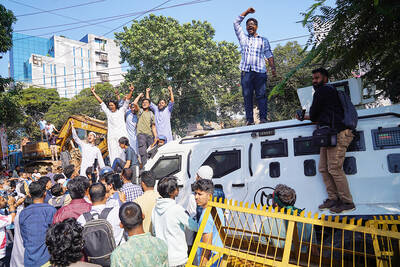French and Spanish rescuers on Sunday scrambled to reopen railways, douse forest fires and restore power to nearly a million homes plunged into darkness by a violent storm that killed 24 people in southern Europe.
“The priority today is to re-establish the electricity as quickly as possible,” French President Nicolas Sarkozy said as he visited a town in the southwestern region that bore the brunt of Saturday’s storm.
The majority of the deaths were in Spain, where four children died near Barcelona when the roof and a wall of a sports hall were brought down on their heads by winds that in some places reached more than 180kph.
They were playing baseball outside the center in Sant Boi de Llobregat as the storm — which saw 20m high waves battering the Atlantic coast — gathered force and they ran inside to shelter.
Witnesses said they heard a loud sound, then saw that the roof and part of a wall had crumpled.
The storm was one of the fiercest to hit western Europe in a decade. It blew in eastwards from the Atlantic Ocean, barreling across southwest France and northern Spain — ripping roofs off houses, pulling down power lines and flattening hundreds of thousands of trees.
On Sunday it battered Italy, where a young woman was swept away to her death by a wave as she was walking on a beach near the southern city of Naples.
Rain also triggered a mudslide onto the main highway south of Naples, killing at least three people and injuring four, the Italian news agency ANSA reported citing firefighters.
Firefighters who pulled the dead and injured from the mud did not exclude that other people could be trapped under the landslide, which occurred on the main highway linking Salerno and Reggio di Calabria.
The winds had lost some of their force but were strong enough to destroy a restaurant in Imperia on the Mediterranean coast and to force some Italian ferry operators to cancel their sailings.
In Portugal, police and firefighters rescued 600 people who were stuck on roads blocked by snow and ice, officials said.
Eight people were killed in France, including four who inhaled carbon monoxide from electricity generators they used amid power outages in two separate incidents.
Two drivers were killed by falling trees on Saturday in the Landes department, while flying debris killed a 78-year-old outside his home. A 73-year-old woman died in the Gironde department when a power cut halted her breathing machine.
Twelve people died in total in Spain, including a woman who was crushed by a wall, another who died after a door lifted by the wind slammed into her, and a police sergeant killed by a falling tree as he was directing traffic.
Hundreds of Spanish firefighters — backed up by 14 planes and helicopters — battled three separate forest fires sparked by electricity pylons brought down by the tempest in northeastern Spain.
The fires were under control by Sunday evening, officials said.

DISASTER: The Bangladesh Meteorological Department recorded a magnitude 5.7 and tremors reached as far as Kolkata, India, more than 300km away from the epicenter A powerful earthquake struck Bangladesh yesterday outside the crowded capital, Dhaka, killing at least five people and injuring about a hundred, the government said. The magnitude 5.5 quake struck at 10:38am near Narsingdi, Bangladesh, about 33km from Dhaka, the US Geological Survey (USGS) said. The earthquake sparked fear and chaos with many in the Muslim-majority nation of 170 million people at home on their day off. AFP reporters in Dhaka said they saw people weeping in the streets while others appeared shocked. Bangladesh Interim Leader Muhammad Yunus expressed his “deep shock and sorrow over the news of casualties in various districts.” At least five people,

LEFT AND RIGHT: Battling anti-incumbent, anticommunist sentiment, Jeanette Jara had a precarious lead over far-right Jose Antonio Kast as they look to the Dec. 14 run Leftist candidate Jeannette Jara and far-right leader Jose Antonio Kast are to go head-to-head in Chile’s presidential runoff after topping Sunday’s first round of voting in an election dominated by fears of violent crime. With 99 percent of the results counted, Jara, a 51-year-old communist running on behalf of an eight-party coalition, won 26.85 percent, compared with 23.93 percent for Kast, the Servel electoral service said. The election was dominated by deep concern over a surge in murders, kidnappings and extortion widely blamed on foreign crime gangs. Kast, 59, has vowed to build walls, fences and trenches along Chile’s border with Bolivia to

DEATH SENTENCE: The ousted leader said she was willing to attend a fresh trial outside Bangladesh where the ruling would not be a ‘foregone conclusion’ Bangladesh’s fugitive former prime minister Sheikh Hasina yesterday called the guilty verdict and death sentence in her crimes against humanity trial “biased and politically motivated.” Hasina, 78, defied court orders that she return from India to attend her trial about whether she ordered a deadly crackdown against the student-led uprising that ousted her. She was found guilty and sentenced to death earlier yesterday. “The verdicts announced against me have been made by a rigged tribunal established and presided over by an unelected government with no democratic mandate,” Hasina said in a statement issued from hiding in India. “They are biased and politically motivated,” she

It is one of the world’s most famous unsolved codes whose answer could sell for a fortune — but two US friends say they have already found the secret hidden by Kryptos. The S-shaped copper sculpture has baffled cryptography enthusiasts since its 1990 installation on the grounds of the CIA headquarters in Virginia, with three of its four messages deciphered so far. Yet K4, the final passage, has kept codebreakers scratching their heads. Sculptor Jim Sanborn, 80, has been so overwhelmed by guesses that he started charging US$50 for each response. Sanborn in August announced he would auction the 97-character solution to K4